Discover the top 15 foods that strengthen immunity naturally and protect your body from colds, flu, and infections. Learn how these powerful superfoods boost your immune system with vitamins, minerals, and antioxidants for year-round health.
Introduction: Why Foods That Strengthen Immunity Naturally Matter
The human body has an incredible defense system designed to protect us from harmful viruses, bacteria, and toxins. But to work at its best, the immune system needs proper nourishment. While many people rely on supplements, science proves that whole, nutrient-dense foods that strengthen immunity naturally are the most effective way to keep your body strong and resilient.
In this article, we’ll explore 15 powerful foods that strengthen immunity naturally, backed by science, history, and cultural traditions. You’ll also learn how to add them into your daily meals with simple tips and recipes. By the end, you’ll have a clear roadmap for building a stronger immune system through food—not pills.
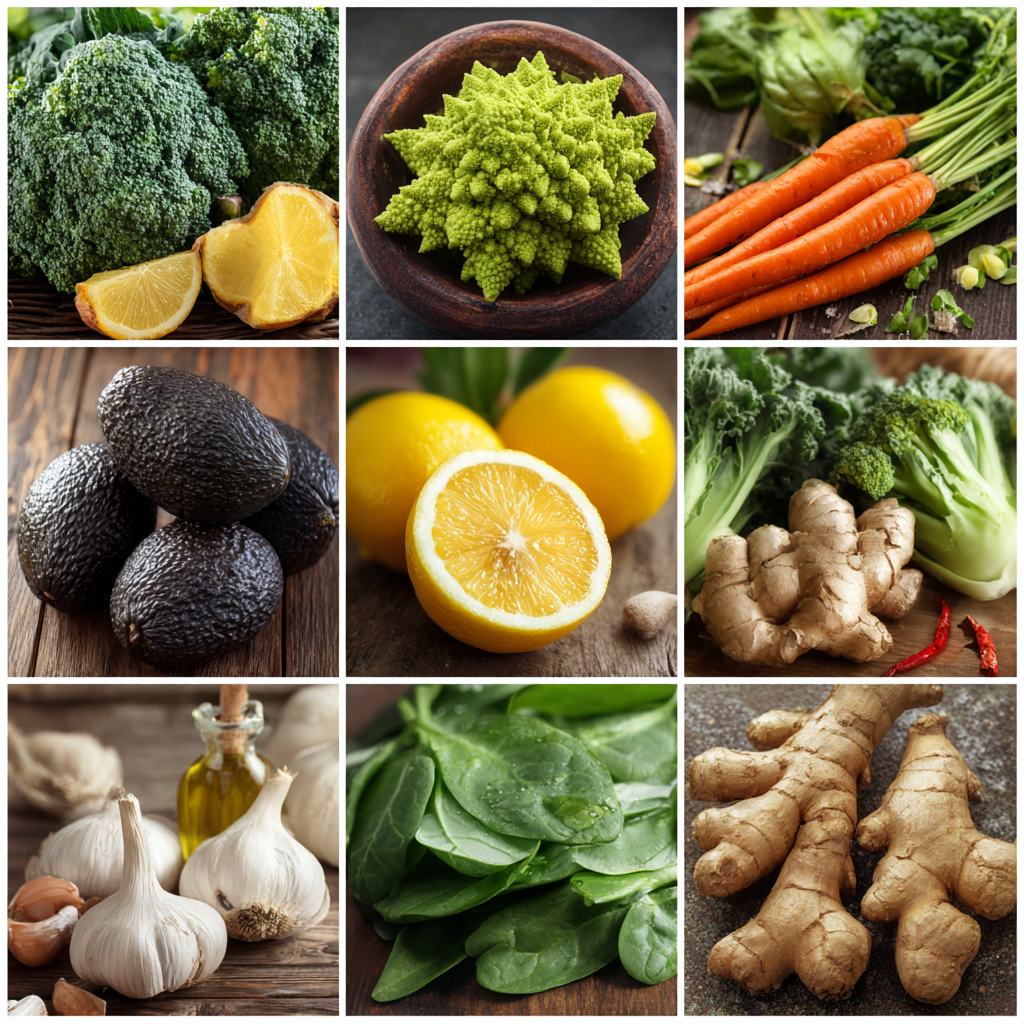
How the Immune System Works – and Why Food Matters
Your immune system is like your body’s army. It includes white blood cells, antibodies, bone marrow, the spleen, and lymph nodes. These defenders identify and destroy harmful invaders like viruses and bacteria.
For this army to function, it needs constant fuel in the form of:
- Vitamin C – boosts white blood cells and antibodies
- Vitamin D – regulates immune response and inflammation
- Zinc – supports cell repair and healing
- Antioxidants – reduce oxidative stress
- Omega-3 fatty acids – lower chronic inflammation
- Probiotics – improve gut health, where 70% of immunity resides
That’s why eating foods that strengthen immunity naturally daily is essential for long-term health.
15 Best Foods That Strengthen Immunity Naturally
1. Garlic – Nature’s Antibiotic
Garlic is one of the oldest known medicinal foods. Ancient Egyptians used it to boost strength in workers, while Greek soldiers ate it before battles for endurance. Modern science credits garlic’s power to allicin, a compound released when garlic is crushed or chopped.
Allicin enhances the ability of white blood cells to fight off infections, reduces inflammation, and may even lower blood pressure. A study published in the Journal of Nutrition confirmed garlic’s antiviral and antibacterial effects.
How to Use:
- Crush raw garlic into salad dressings.
- Add to soups and stews.
- Make garlic tea with lemon and honey.
(Image Alt: Fresh garlic bulbs – powerful food that strengthens immunity naturally)
2. Ginger – The Anti-Inflammatory Root
Ginger has been treasured in Ayurveda and Traditional Chinese Medicine for over 2,000 years. Known for its spicy warmth, ginger contains gingerol, which has strong antioxidant and anti-inflammatory effects.
It improves circulation, helps fight respiratory infections, and reduces sore throat symptoms. Some studies suggest ginger can also inhibit the growth of certain bacteria.
How to Use:
- Brew ginger tea with honey and lemon.
- Add fresh ginger to stir-fries.
- Blend into smoothies for a zesty kick.
3. Citrus Fruits – Vitamin C Powerhouses
Oranges, grapefruits, lemons, and mandarins are rich in Vitamin C, which supports immune cell function and enhances iron absorption. Since Vitamin C is water-soluble and not stored in the body, daily intake is vital.
During the 18th century, British sailors carried lemons on long voyages to prevent scurvy—a disease caused by Vitamin C deficiency. Today, citrus remains a global symbol of immunity.
How to Use:
- Drink fresh orange juice in the morning.
- Add lemon juice to warm water.
- Use grapefruit segments in salads.
4. Turmeric – Golden Spice of Immunity
Turmeric has been part of Indian Ayurvedic medicine for over 4,000 years. Its active compound curcumin is a powerful antioxidant and anti-inflammatory agent. Curcumin has been studied for its ability to modulate the immune system and improve antibody responses.
How to Use:
- Mix turmeric with milk for “golden milk.”
- Add to curries and soups.
- Use with black pepper to enhance curcumin absorption.
5. Yogurt – Probiotic Rich Food
Your gut is often called the “second brain” because it houses billions of bacteria that influence immunity. Probiotic-rich foods like yogurt restore gut balance and reduce infection risks.
Historically, yogurt originated in Central Asia and spread to the Middle East, where it became a staple for digestive and immune health.
How to Use:
- Choose plain yogurt with live cultures.
- Add honey and fruits.
- Blend into smoothies.
6. Green Tea – Antioxidant Elixir
Green tea contains catechins, especially EGCG, which enhance immune cell activity. It also provides L-theanine, which supports T-cell production.
In Japan and China, tea has been consumed for centuries not just as a drink, but as medicine. Studies show green tea drinkers have stronger immune responses and lower risk of infections.
How to Use:
- Drink 2–3 cups daily.
- Use matcha powder in smoothies.
7. Spinach – Leafy Green Defense
Spinach is rich in Vitamin C, beta-carotene, and antioxidants. It supports infection-fighting cells and helps wounds heal faster.
During WWII, spinach was promoted as a vital food for soldiers due to its nutrient density.
How to Use:
- Blend into green smoothies.
- Add to omelets.
- Sauté with olive oil and garlic.
8. Almonds – Vitamin E Boost
Almonds provide Vitamin E, which plays a critical role in regulating immune function. Unlike Vitamin C, Vitamin E is fat-soluble, meaning it needs healthy fats for absorption.
How to Use:
- Eat a handful as a snack.
- Add to yogurt or oatmeal.
- Blend into almond butter.
9. Sunflower Seeds – Zinc and Selenium Rich
Sunflower seeds are loaded with Vitamin E, zinc, and selenium, nutrients crucial for immunity. Selenium helps reduce oxidative stress, while zinc aids in healing.
How to Use:
- Sprinkle on salads.
- Mix into granola.
- Blend into seed butter.
10. Chicken Soup – Comfort Food with Science
Chicken soup has been used across cultures as a healing food. In Jewish tradition, it’s known as “Jewish penicillin.” Modern science shows chicken contains cysteine, an amino acid that thins mucus and helps immune function.
How to Use:
- Make broth with chicken bones, garlic, ginger, and vegetables.
11. Mushrooms – Immune Modulators
Mushrooms like shiitake, maitake, and reishi have been used in Chinese medicine for centuries. They contain beta-glucans, which boost white blood cells and help fight infections.
How to Use:
- Add mushrooms to soups and stir-fries.
- Use powdered reishi in tea.
12. Honey – Natural Antibacterial Superfood
Raw honey has antibacterial and antiviral properties. Ancient Egyptians used it for wound healing, while Greek athletes consumed it for energy.
How to Use:
- Add to tea.
- Use in homemade cough syrup with ginger and lemon.
13. Broccoli – Antioxidant Rich Super Veggie
Broccoli contains sulforaphane, a compound that activates immune defenses. It’s also rich in Vitamin C and fiber, making it one of the top immunity foods.
How to Use:
- Steam lightly to preserve nutrients.
- Add to stir-fries and pasta.
14. Pomegranates – Antiviral Fruit
Pomegranates are packed with polyphenols that fight viruses and reduce inflammation. In Persian medicine, pomegranates symbolized health and fertility.
How to Use:
- Eat fresh seeds.
- Drink fresh juice.
15. Salmon – Omega-3 Rich Immunity Food
Fatty fish like salmon, sardines, and mackerel provide omega-3 fatty acids, which reduce chronic inflammation. They also supply Vitamin D, essential for immune regulation.
How to Use:
- Grill salmon with lemon and garlic.
- Add to salads.
How to Incorporate Foods That Strengthen Immunity Naturally Into Daily Life
- Breakfast: Yogurt with almonds and pomegranate seeds.
- Lunch: Spinach salad with citrus dressing.
- Dinner: Salmon with garlic broccoli.
- Snacks: Sunflower seeds and green tea.
- Drinks: Ginger tea or golden milk with turmeric.
Here’s a complete set of recipes meals and drinks, with ingredients and simple step-by-step instructions:
Breakfast: Yogurt with Almonds and Pomegranate Seeds
Ingredients:
- 1 cup plain Greek yogurt (unsweetened)
- 2 tbsp raw or lightly toasted almonds (chopped)
- 3 tbsp pomegranate seeds
- 1 tsp honey or maple syrup (optional)
- A pinch of cinnamon (optional)
Instructions:
- Scoop the yogurt into a serving bowl.
- Sprinkle chopped almonds and pomegranate seeds over the top.
- Drizzle with honey and dust with cinnamon if desired.
- Serve chilled for a refreshing and protein-packed breakfast.
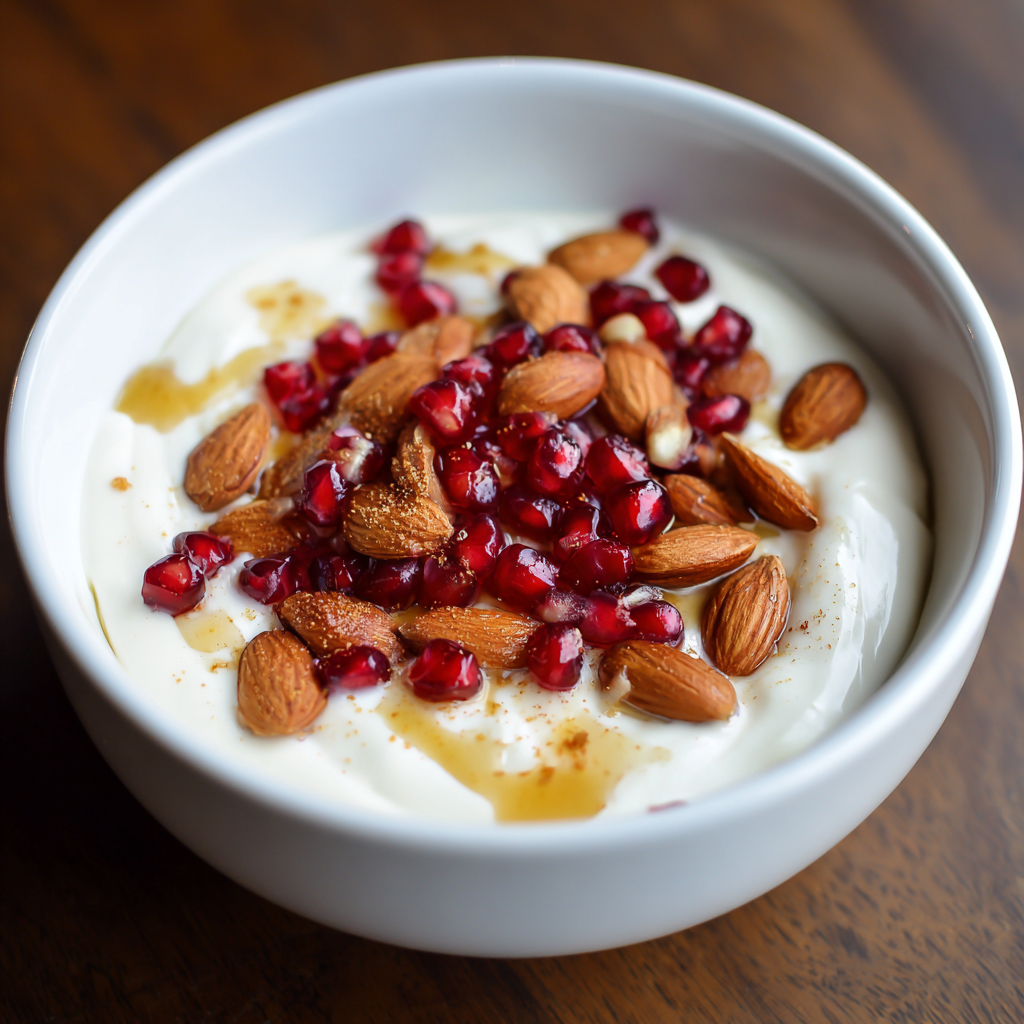
Lunch: Spinach Salad with Citrus Dressing
Ingredients:
- 2 cups fresh baby spinach leaves
- 1 orange (peeled and segmented)
- ½ grapefruit (peeled and segmented, optional)
- ¼ red onion, thinly sliced
- 2 tbsp walnuts or pecans (optional, toasted)
Citrus Dressing:
- 3 tbsp fresh orange juice
- 1 tbsp lemon juice
- 1 tsp honey or maple syrup
- 2 tbsp olive oil
- Salt and black pepper to taste
Instructions:
- In a small bowl, whisk together orange juice, lemon juice, honey, olive oil, salt, and pepper.
- In a large salad bowl, add spinach, citrus segments, and red onion.
- Toss with the dressing until evenly coated.
- Sprinkle nuts on top and serve fresh.
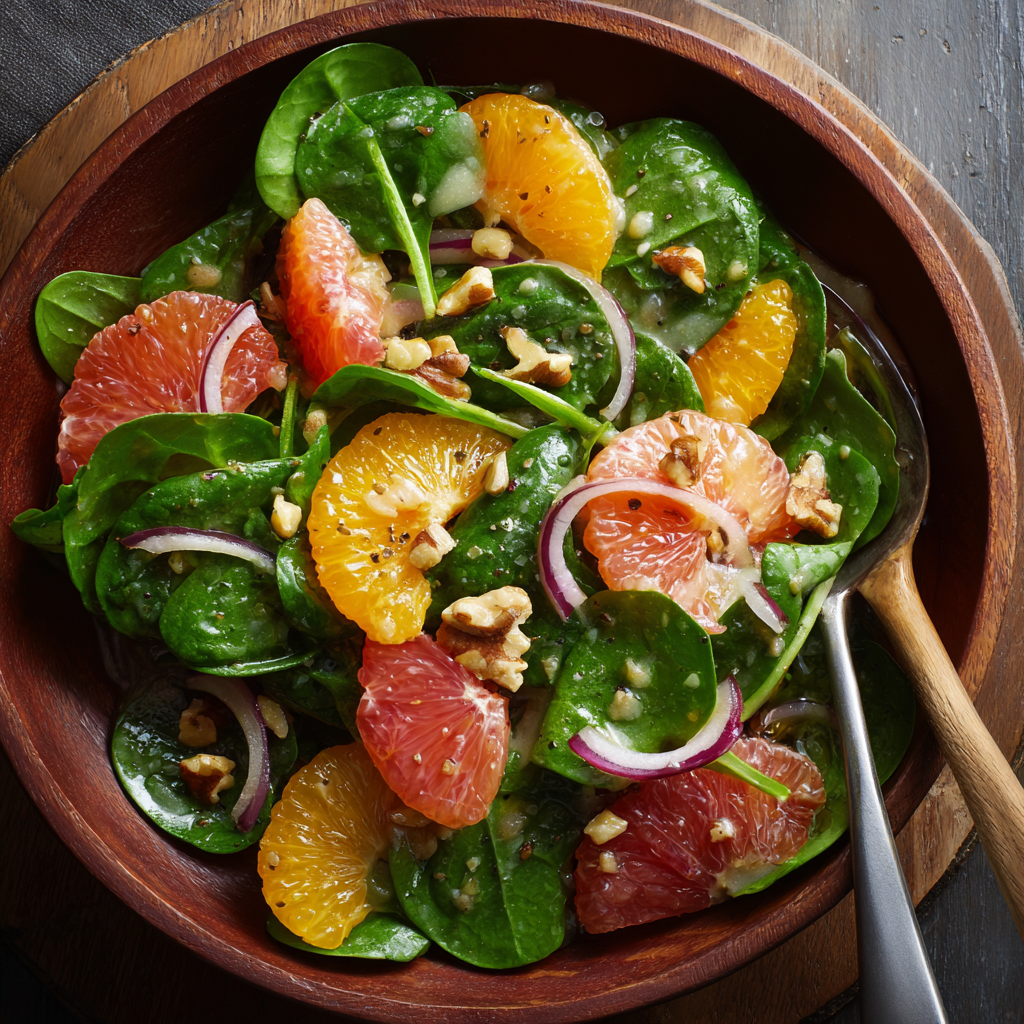
Dinner: Salmon with Garlic Broccoli
Ingredients:
- 2 salmon fillets
- 2 tbsp olive oil
- 2 garlic cloves, minced
- 1 tbsp lemon juice
- Salt and black pepper to taste
For the Broccoli:
- 2 cups broccoli florets
- 1 tbsp olive oil
- 2 garlic cloves, sliced
- Salt and pepper to taste
Instructions:
- Preheat oven to 400°F (200°C).
- Place salmon on a baking sheet, drizzle with olive oil, lemon juice, garlic, salt, and pepper.
- Bake for 12–15 minutes, until flaky and cooked through.
- Meanwhile, heat olive oil in a skillet. Add sliced garlic and broccoli. Sauté for 4–5 minutes until broccoli is bright green and slightly tender.
- Serve salmon with garlic broccoli on the side.
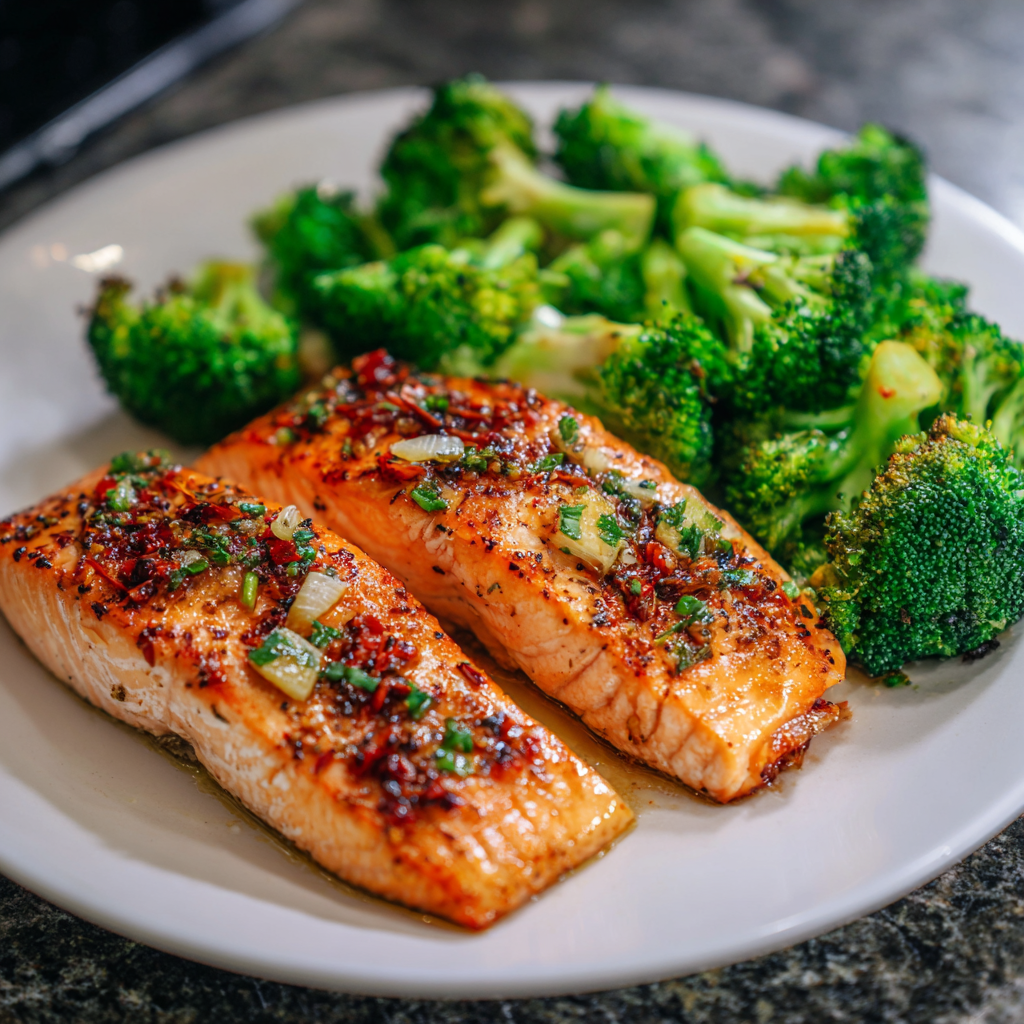
Snacks: Sunflower Seeds and Green Tea
Ingredients:
- ¼ cup roasted sunflower seeds (unsalted preferred)
- 1 bag green tea (or 1 tsp loose leaves)
- 1 cup hot water
Instructions:
- Brew green tea by steeping the tea bag (or leaves) in hot water for 3–5 minutes.
- Pair with a handful of sunflower seeds for a light and healthy snack.
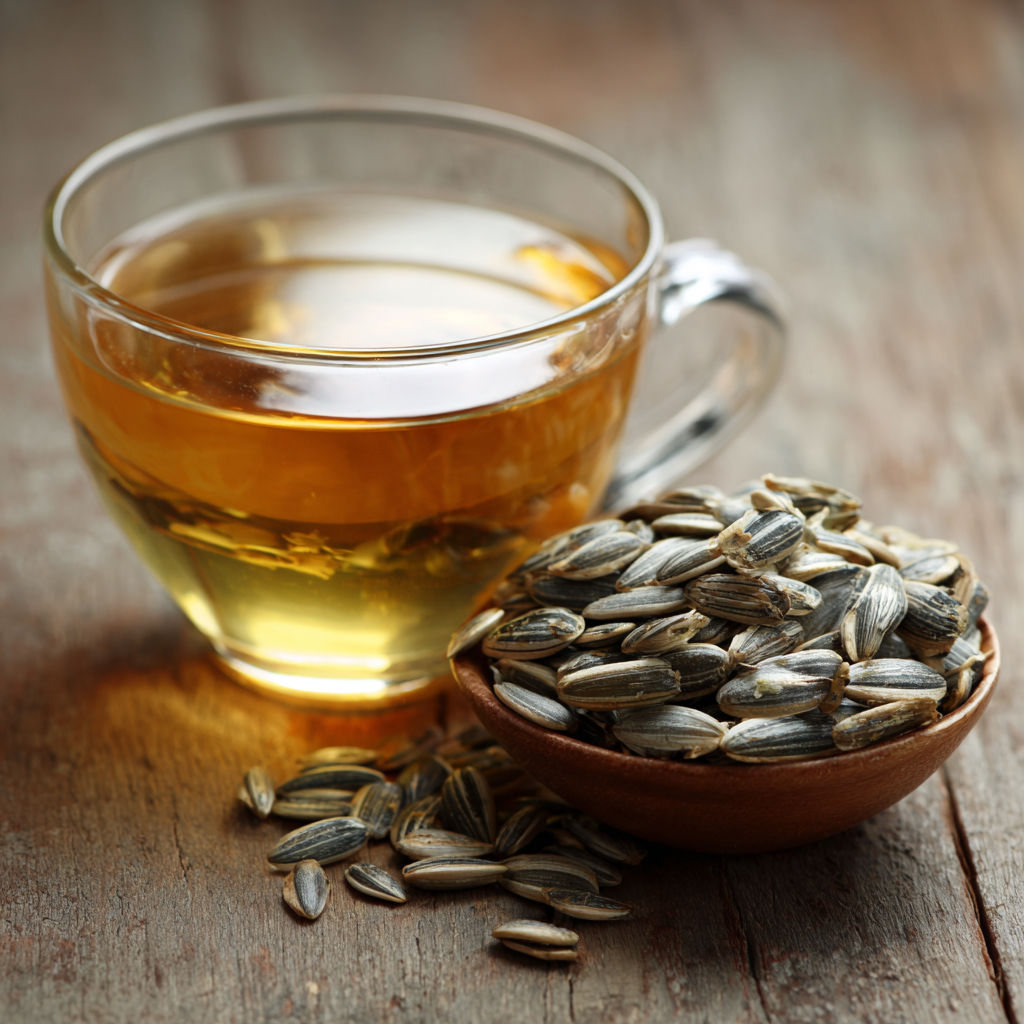
Drinks: Ginger Tea or Golden Milk with Turmeric
Ginger Tea
- 1-inch piece fresh ginger, sliced
- 1 cup water
- 1 tsp honey or lemon juice (optional)
Instructions:
- Boil water and add sliced ginger.
- Simmer for 5–7 minutes.
- Strain and add honey or lemon if desired.
Golden Milk (Turmeric Latte)
- 1 cup milk (dairy or plant-based)
- ½ tsp ground turmeric
- ¼ tsp ground cinnamon
- A pinch of black pepper
- 1 tsp honey or maple syrup (optional)
Instructions:
- Warm the milk in a saucepan.
- Stir in turmeric, cinnamon, black pepper, and sweetener.
- Simmer (don’t boil) for 3–4 minutes.
- Pour into a cup and enjoy warm.
FAQs About Foods That Strengthen Immunity Naturally
Q1: Can foods really prevent illness?
They can’t guarantee prevention, but they strengthen your defenses and reduce severity of infections.
Q2: How long does it take for immune-boosting foods to work?
Consistency matters—daily intake supports long-term resilience.
Q3: Are supplements as effective as natural foods?
Supplements may help but whole foods offer broader nutrients.
Q4: What are the worst foods for immunity?
Sugary snacks, processed foods, and excessive alcohol.
Q5: Can children and seniors benefit from these foods?
Yes, but honey should not be given to infants under one year.
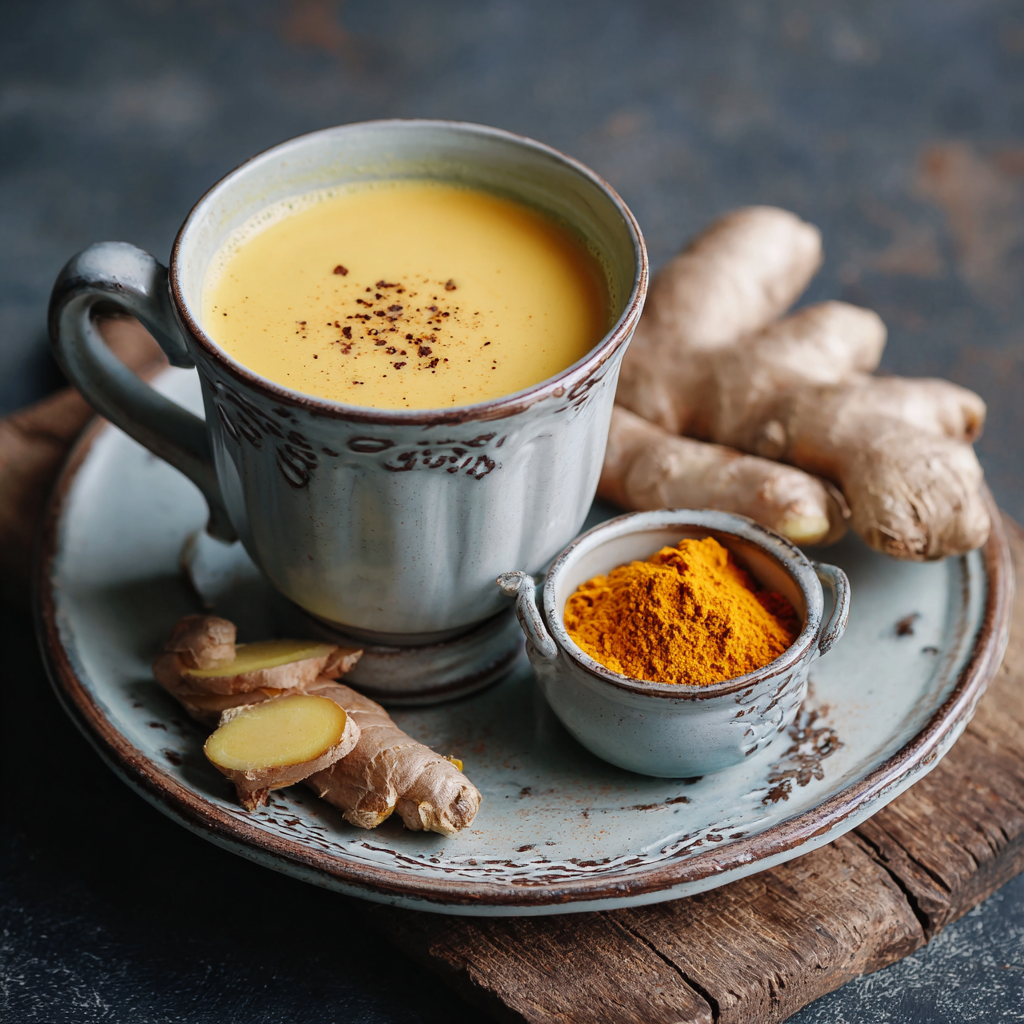
Conclusion: Build Immunity Through Food, Not Pills
Your kitchen already holds the best medicine—foods that strengthen immunity naturally. From garlic and ginger to salmon and pomegranates, these foods provide the vitamins, minerals, and antioxidants your body needs to stay strong.
By incorporating them daily, you’re not just eating—you’re protecting your health, reducing inflammation, and strengthening your natural defenses.
👉 Remember: immunity begins on your plate.
